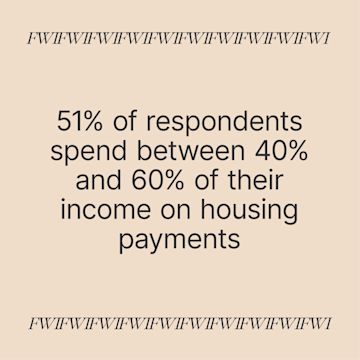
What's the Financial Wellness Index?
Financial Wellness Index
This research project, promoted by the online bank N26 and the Advantere School of Management, seeks to create a financial wellbeing index to analyze the situation and evolution of Spanish society in different aspects such as income, savings, housing, planning and indebtedness. Read on to discover the main conclusions of the 2023-24 edition!
Spaniards and housing
The concerns about paying the mortgage or rent are on the rise, according to this year's FWI findings. This is due to the increase in spending on housing compared to last year, which accounts for more than half of the monthly income of most of the users surveyed. This effort in turn affects Spaniards' ability to cover their regular expenses.

Spaniards and housing: Main conclusions
From the second edition of the Financial Wellness Index (FWI), a study conducted by Advantere School of Management for the online bank N26, the following conclusions emerge:
-
51% of those surveyed recognize that they spend between 40% and 60% of their monthly income on rent or mortgage payments for their home.
- More than half of these 51% live in Catalonia or Madrid (15% and 12%, respectively), and only 5% live in the Valencian Community.
- 26% now allocate more than 10% more resources to housing payments compared to the last year, while 41% pay between 6% and 9% more.
- More than 40% of those surveyed say they run out of money at the end of the month for food or other expenses such as electricity, water or cell phones, a situation that is repeated almost every month.
-
85% of Spaniards m__eet their bills and credit commitments with "difficulty"__ or "a great deal of difficulty.
- 15% of residents in Catalonia and 9% of residents in the Community of Madrid find it "a challenge. In addition, 10% of both groups face them with "a lot of difficulty", while only 4% of those surveyed in the Valencian Community face these expenses with "great difficulty".
- 36% of those surveyed do not consider that their income comes from a recurrent and reliable source.
- Spaniards who say they run out of money at the end of the month for food or other regular expenses are, 56%, full-time salaried workers.
Spaniards and savings
With the first half of the year behind us and the summer vacations on the horizon, it is time to review whether the savings goals set at the beginning of 2024 are being met. In Spain, there has been a significant drop in savings capacity according to those surveyed, regardless of gender and age, between 2022 and 2023.

Spaniards and savings: main conclusions
-
Nearly 60% of respondents have a clear set of savings objectives and goals to cover emergencies and possible large expenses.
- However, 18% partially or totally disagree with this idea.
- In addition, 64% say they periodically review their budget and organize their spending.
-
However, this contrasts with the fact that 85% of Spaniards recognize that it is "difficult" or "very difficult" to meet their bills and credit commitments.
- And only __2% do not deal with these complication__s when it comes to covering their expenses.
Research methodology
Research methodology
To compile the Financial Wellness Index, students of the Master in Finance at Advantere School of Management analyze the aggregated and anonymous responses of more than 1,000 N26 customers in Spain to a questionnaire structured in different blocks (income, salary, budget, housing, savings, planning and indebtedness). The latest survey was conducted between October and November of 2023.Research and Studies
The Education Price Index 2022 — a Study by N26An analysis of the cost of higher education in countries around the world, including the cost of studying six common degree subjects, and local salary levels—as well as the typical local salaries for graduates of each degree.
The Cost of Living in Europe: N26 Liveability IndexExplore the country rankings for 12 European countries and compare their performance on the N26 Liveability Index.
Which Europeans saved and spent the most in 2021?N26 data indicates that Spanish customers saved more in 2021 than their European counterparts—and European women were better at saving than men. For more saving and spending insights, read on.


